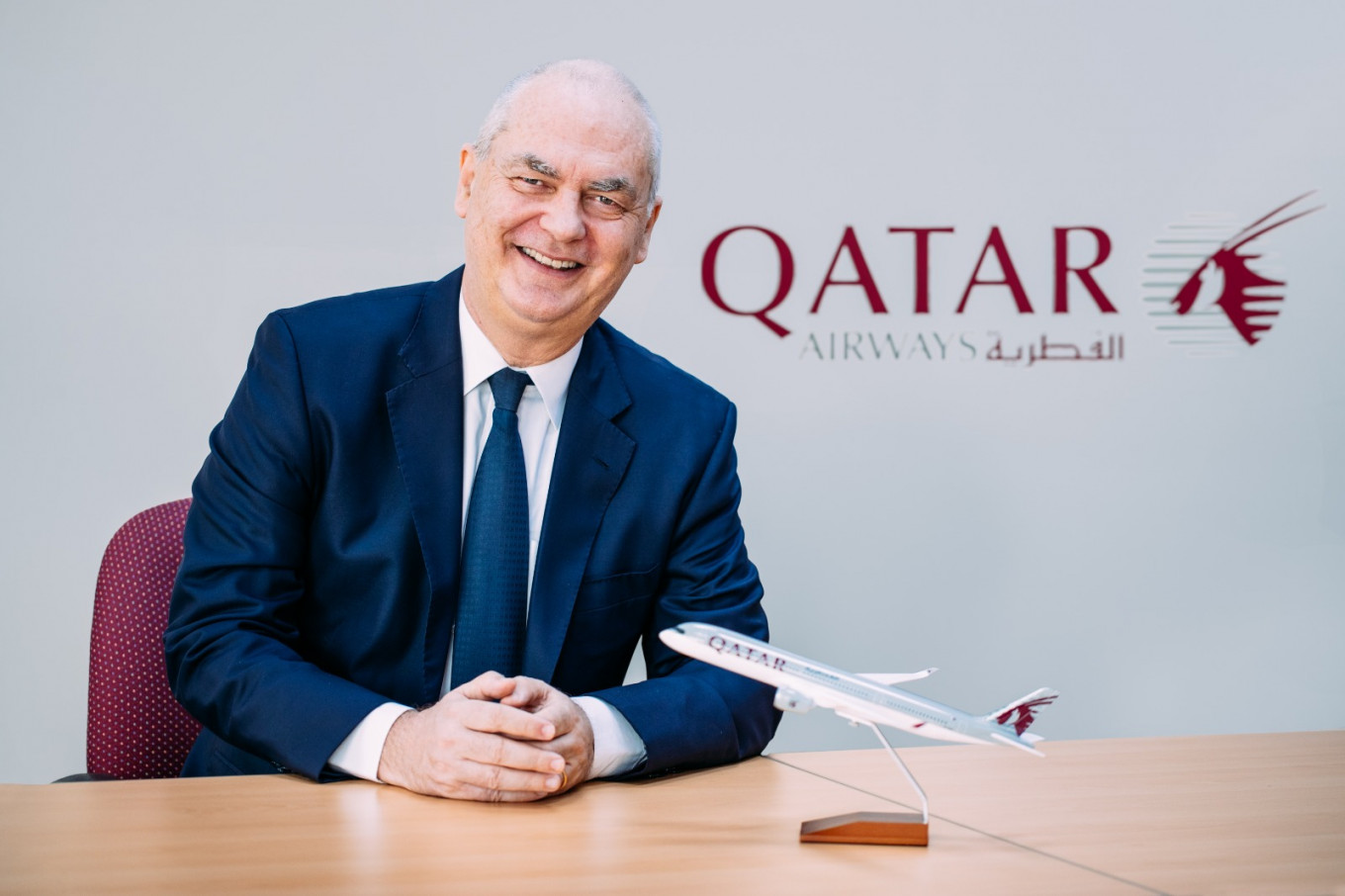Popular Reads
Top Results
Can't find what you're looking for?
View all search resultsPopular Reads
Top Results
Can't find what you're looking for?
View all search resultsExecutive column: It’s always important to expand our operations: Qatar Airways
Nevertheless, we want to further consolidate our position as the leader of the global connector during the COVID-19 pandemic and become the leading airline connecting Indonesia and Europe.
Change text size
Gift Premium Articles
to Anyone
T
he global aviation industry has been severely hit by the COVID-19 pandemic, which has prompted government to close borders and impose movement restrictions across the world. The International Air Transport Association (IATA) forecast losses totaling US$84.3 billion for airlines this year amid the global health crisis.
In Indonesia, Southeast Asia’s largest economy, the number of foreign arrivals has dropped by more than 59 percent year-on-year (yoy) to 3.09 million, according to Statistics Indonesia (BPS) data.
As the number of passengers dropped, airline operators have been taking a number of initiatives to keep their companies afloat, including cost reduction measures and cargo service optimization.
The Jakarta Post’s Mardika Parama and Farida Susanty interviewed Qatar Airways chief strategy and transformation officer Thierry Antinori on July 17 to learn more about the global airline’s strategy to weather the crisis.
Question: Has the pandemic changed Qatar Airways’ short-term and long-term strategy in Southeast Asia and particularly in Indonesia?
Answer: I think Indonesia and Southeast Asia’s markets are important because of the country and the region’s demography. Therefore, it’s always important to expand our operations to Indonesia and Southeast Asia, even though it has been slow since last year due to an illegal blockade imposed on Qatar by neighboring countries. Nevertheless, we want to further consolidate our position as the leader of the global connector during the COVID-19 pandemic and become the leading airline connecting Indonesia and Europe.
What will Qatar’s future operations in Indonesia be like amid the drop of international travelers? Is there any plan for a route expansion?
We have been increasing our flight schedule through Jakarta from seven flights per week in June to 11 flights per week. We also started to fly to Bali with three flights per week, which is more than other airlines.
What makes Bali an important destination for Qatar’s operation? Will the tourism recovery of the island help the airline’s operation?
Bali is a tourism center and one of the favorite travel destinations for our European customers. As we operate from 20 cities around Europe, we could fly them to the island. We understand that today Bali is partly closed. However, we want to keep the economic engine running by helping the tourism stakeholders in the island.
How did Qatar Airways transform its operations to adapt to the current situation, and what is the current status of the airline’s operations in terms of occupancy rates?
There has been a bit of change in our financial metrics. Currently, we are counting our revenues from cargo and passengers versus the operation cost and also draw comparisons between operating or grounding the flight routes.
Qatar Airways has been fortunate to have a cash positive status from our revenue compared to the operating costs. Of course, we still need to consider the fixed cost, which means we are still losing money, like other airlines, but we lose less money and generate more cash.
Our flights to Jakarta have also shown a very good load with [relatively high] occupancy. We also notice that our market share has been growing lately.
Many airlines have taken many cost-saving measures during the pandemic. Have there been such measures within Qatar Airways?
We have accelerated our cost planning transformation that [started] prior to the COVID-19 [pandemic]. We also let go of 20 percent of our staff, but we didn’t impose wage cuts as big as others. We renegotiate with our suppliers, review our processes and do the classic works. However, to emerge positively from COVID-19, we would still need customers and trade. Therefore, we’re not only cutting costs but also continue to invest in our products to generate more revenue, with a higher share, as the global flight market is currently smaller.
Recently, British Airways decided to retire its entire Boeing 747 fleet to push down costs amid the drop in flight occupancy. Will Qatar Airways retire some of its big aircraft?
What we decided to do is to ground the Airbus A380, the biggest aircraft in our fleet, as long as demand hasn’t recovered. We don’t want to use this aircraft on any routes during these conditions, because it’s not financially viable and environmentally friendly. However, we do not plan to retire our aircraft at this stage. In the case of British Airways, we think it's a good decision, because the Boeing 747 is a very old aircraft. Meanwhile, we have younger aircraft that are less than around five years old.
In late March, Qatar Airways group chief executive Akbar Al Baker said Qatar Airways would have to seek government support as the company’s cash was thinning. Has there been any further discussion with the government on a possible rescue package?
Because we are able to generate cash during the crisis, we’ve been able to avoid going back to our shareholders for a capital injection at this stage, due to our credit lines and cash generated by our operations. However, Mr. Al Baker said clearly, like a normal company, we would have to go to our shareholders if the situation continues, in regards to a possible capital injection, but that has nothing to do with government subsidies.










